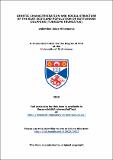Genetic characterisation and social structure of the East Scotland population of bottlenose dolphins (Tursiops truncatus)
Abstract
The Eastern Scottish population of bottlenose dolphins (Tursiops truncatus) is
the northernmost population of this species. The resident core of this
population consists of 120 to 150 different individuals. This small size and its
geographical isolation from other populations raises questions about its
viability and whether the population has behavioural patterns that differ
from those common to other populations of the same species. Microsatellite
genetic diversity was low and mitochondrial DNA genetic diversity values
were lowest in East Scotland compared to other populations worldwide and
to neighbouring populations around UK waters. It has been well
documented, from four different field sites worldwide, that male bottlenose
dolphins form alliances with preferred male associates. These alliances can
last for several years and the males involved show association coefficients similar to those of mothers and calves (0.8-1.0). These alliances
appear to be of great importance in obtaining matings for the males. In the
Eastern Scottish population males do not form alliances. No evidence of
strong associations between individuals of either sex was found and there
was no correlation between association and relatedness patterns. I suggest
that the isolation and small size of the population together with reduced
genetic diversity affects the pressure of kin selection for altruistic behaviours.
There is no gain in competing or associating with close relatives for access to
mates and it might be more important to avoid inbreeding by dispersing.
Although evidence of gene flow between East Scotland and its neighbouring
populations was not confirmed with Bayesian clustering analysis, a small set
of individuals from Wales were found to be closely related to individuals
from the East Coast of Scotland. In general the dynamics found in UK water
populations resemble those of the Western North Atlantic with sympatric
populations of coastal as well as pelagic individuals.
Type
Thesis, PhD Doctor of Philosophy
Items in the St Andrews Research Repository are protected by copyright, with all rights reserved, unless otherwise indicated.

